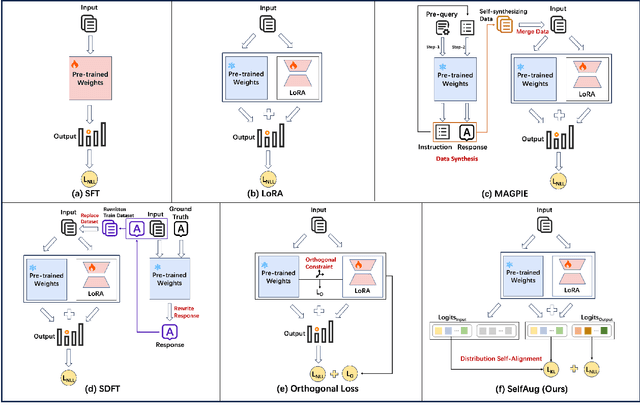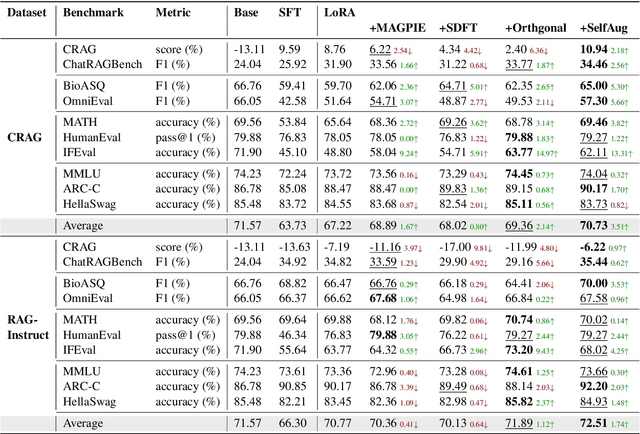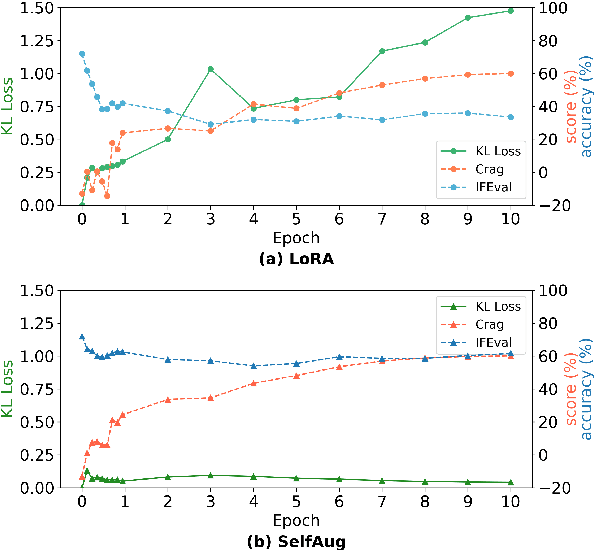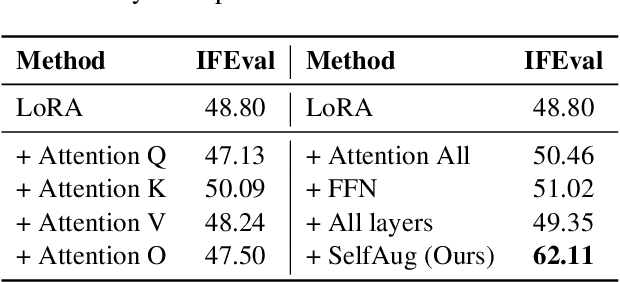Rongyang Zhang
SelfAug: Mitigating Catastrophic Forgetting in Retrieval-Augmented Generation via Distribution Self-Alignment
Sep 04, 2025



Abstract:Recent advancements in large language models (LLMs) have revolutionized natural language processing through their remarkable capabilities in understanding and executing diverse tasks. While supervised fine-tuning, particularly in Retrieval-Augmented Generation (RAG) scenarios, effectively enhances task-specific performance, it often leads to catastrophic forgetting, where models lose their previously acquired knowledge and general capabilities. Existing solutions either require access to general instruction data or face limitations in preserving the model's original distribution. To overcome these limitations, we propose SelfAug, a self-distribution alignment method that aligns input sequence logits to preserve the model's semantic distribution, thereby mitigating catastrophic forgetting and improving downstream performance. Extensive experiments demonstrate that SelfAug achieves a superior balance between downstream learning and general capability retention. Our comprehensive empirical analysis reveals a direct correlation between distribution shifts and the severity of catastrophic forgetting in RAG scenarios, highlighting how the absence of RAG capabilities in general instruction tuning leads to significant distribution shifts during fine-tuning. Our findings not only advance the understanding of catastrophic forgetting in RAG contexts but also provide a practical solution applicable across diverse fine-tuning scenarios. Our code is publicly available at https://github.com/USTC-StarTeam/SelfAug.
ChemEval: A Comprehensive Multi-Level Chemical Evaluation for Large Language Models
Sep 21, 2024



Abstract:There is a growing interest in the role that LLMs play in chemistry which lead to an increased focus on the development of LLMs benchmarks tailored to chemical domains to assess the performance of LLMs across a spectrum of chemical tasks varying in type and complexity. However, existing benchmarks in this domain fail to adequately meet the specific requirements of chemical research professionals. To this end, we propose \textbf{\textit{ChemEval}}, which provides a comprehensive assessment of the capabilities of LLMs across a wide range of chemical domain tasks. Specifically, ChemEval identified 4 crucial progressive levels in chemistry, assessing 12 dimensions of LLMs across 42 distinct chemical tasks which are informed by open-source data and the data meticulously crafted by chemical experts, ensuring that the tasks have practical value and can effectively evaluate the capabilities of LLMs. In the experiment, we evaluate 12 mainstream LLMs on ChemEval under zero-shot and few-shot learning contexts, which included carefully selected demonstration examples and carefully designed prompts. The results show that while general LLMs like GPT-4 and Claude-3.5 excel in literature understanding and instruction following, they fall short in tasks demanding advanced chemical knowledge. Conversely, specialized LLMs exhibit enhanced chemical competencies, albeit with reduced literary comprehension. This suggests that LLMs have significant potential for enhancement when tackling sophisticated tasks in the field of chemistry. We believe our work will facilitate the exploration of their potential to drive progress in chemistry. Our benchmark and analysis will be available at {\color{blue} \url{https://github.com/USTC-StarTeam/ChemEval}}.
 Add to Chrome
Add to Chrome Add to Firefox
Add to Firefox Add to Edge
Add to Edge